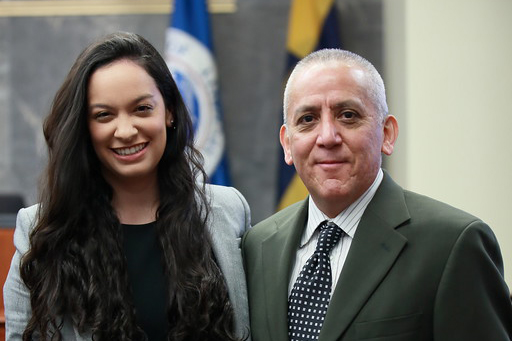
Professor Alberto Benitez at the GW Immigration Clinic reports:
Friends,
Our friend, colleague, and alum Paulina Vera shared this story. Congratulations Daniel!
“A current Immigration Judge shared that he spoke to his colleague, another Immigration Judge (“IJ”), about a recent virtual hearing handled by student-attorney, Daniel Fishelman ’22. IJ complimented the Clinic’s preparation and Daniel’s performance, stating that even though it was for a short matter, she was impressed by the Clinic. This was the Clinic’s first appearance before IJ. Please join us in congratulating Daniel on completing his first hearing and getting positive feedback from Immigration Judges!”
**************************************************
Alberto Manuel Benitez
Professor of Clinical Law
Director, Immigration Clinic
The George Washington University Law School
THE WORLD IS YOURS
******************
Many congrats to student-attorney, Daniel Fishelman ’22 on his first engagement as a member of the NDPA!👍🏼😎
Also, congrats to my friends and “due process role models” Alberto and Paulina! So proud that part of Paulina’s “immigration justice journey” went through the Arlington Immigration Court, where she served as an intern.
Alberto and Paulina tell me that after their “standard rigorous prep session” with Daniel, he definitely was “QRFPT” — “Quite Ready For Prime Time!” 😎 That’s as opposed to “NQRFPT” (“Not Quite Ready For Prime Time”) ☹️ — something to be avoided in Immigration Court or any other type of litigation!☠️
This case illustrates what I found on the bench: that “short cases” are almost always the result of superior scholarship, meticulous preparation, and informed dialogue by counsel for both parties before getting to court.
That’s why one grossly underutilized tool for reducing backlogs is investing in and encouraging more and better trained representation for individuals appearing in Immigration Court.
As statistics have shown time after time, universal representation is also the key to achieving high appearance rates.
Additionally, constructing court dockets and scheduling cases locally with input from both counsel is a way of reversing the backlog building “Aimless Docket Reshuffling” (“ADR”) produced by attempting to manage dockets from “on high.” ADR usually results from EOIR unilaterally attempting to satisfy DHS enforcement aims or to accommodate “disconnected political agendas and ill-advised gimmicks” generated by DOJ and White House politicos — invariably clueless about the realities of Immigration Court practice!
The three things always left behind by ADR: due process, fundamental fairness, and practical efficiency!
🇺🇸 Due Process Forever!
PWS
02-24-22
